Intellectual Property in Terms & Conditions
There are legal methods for registering your intellectual property so you can enforce your rights in court, but you also need a way to enforce your interests in a less formal and more immediate manner.
You can do that with intellectual property protection provisions in your Terms & Conditions (T&C) agreement, also known as Terms of Use or Terms of Service.
Clauses for Intellectual Property in Terms and Conditions
To secure enforcement against intellectual property violations, you need to:
- Include the correct terms in your Terms & Conditions, and
- Make sure users accept your Terms & Conditions
Business owner often believe that registering their intellectual property with the right offices is enough. In many cases, this is true - if you intend to go after every infringer with a lawsuit and a request for damages.
However, that does not always solve the problem. A proper Terms & Conditions agreement will help in a number of ways.
First, it places users on notice that the intellectual property belongs to you.
When they accept the Terms & Conditions, they also acknowledge that you have proprietary interests where they cannot interfere. That notice in your agreement is the grounds for all enforcement and protection measures.
Notice is also important because it's unlikely you can register for copyright protection in every country where you have users.
Second, you need practical solutions.
The Terms & Conditions agreement can give you the authority to terminate or deactivate user accounts when inappropriate use of your intellectual property is detected.
Finally, your intellectual property is important.
Trademarks represent your brand and help your products stand out in the market. They are like a hailing beacon to your users. If people start copying and distributing them, it makes it difficult to distinguish your authentic brand from the copy.
Besides trademarks and brand, the operation of your website or app depends on your intellectual property. If there is a unique brand associated with your website or app, that offers you an edge that could disappear if someone makes an unauthorized copy of your website or app.
Enforcement of Intellectual Property
To enjoy the "enforcement power" in the intellectual property provisions, you need users to accept the terms. The best way to accomplish this is through the clickwrap method, often used at sign-up forms.
Clickwrap forces users to accept your Terms & Conditions and Privacy Policy agreement when signing up. It often refers to pressing a "submit", "register" or "sign up" button to make it effective. If users don't agree to your Terms, they cannot complete sign-up.
Meetup takes this approach:
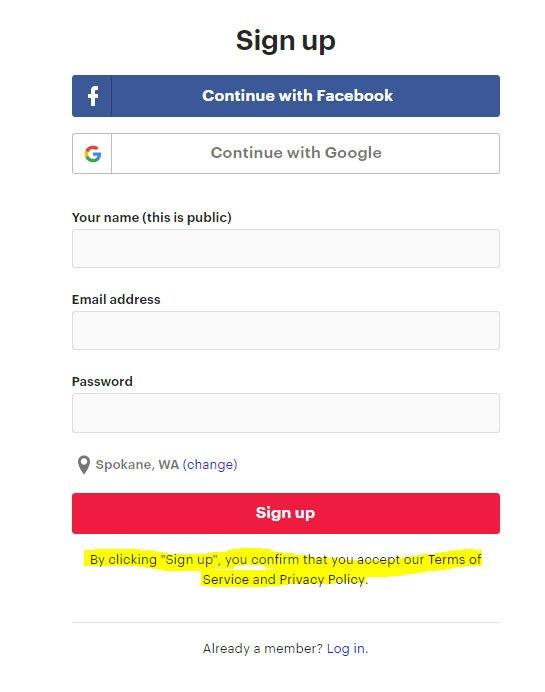
BBC asks several questions at sign-up to confirm user preferences. It also makes it clear that users who create an account are bound to BBC's Terms of Use, Cookie Policy and Privacy Policy agreements:
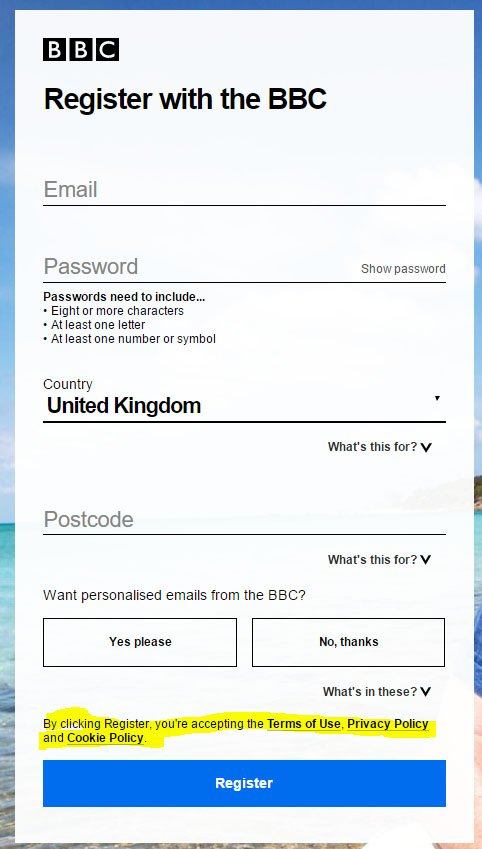
Other companies prefer the additional "I agree" checkbox to assure acceptance of the terms.
BambooHR not only has a sign-up process for users to access its online software, but it requires them to check a box indicating agreement with the Terms of Service and Privacy Policy:
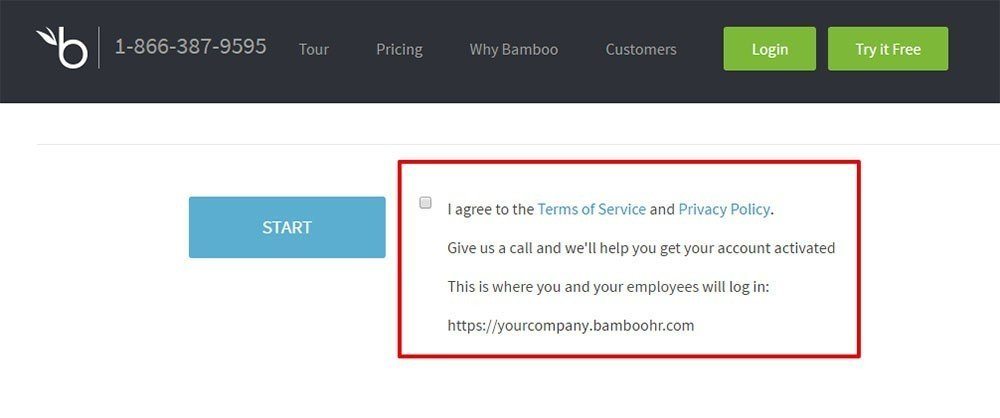
Examples of Intellectual Property in Terms & Conditions
RescueTime is a productivity tool that discourages distraction on the Internet. Its Terms of Service agreement also emphasize trademarks since it has distinguishable user icons:

RescueTime also follows up on its trademark information by stating a rule against use of its intellectual property:

Amazon groups its interests by category and contains links to lists of intellectual property it owns. Its intellectual property protection provisions are among the most extensive of these examples:
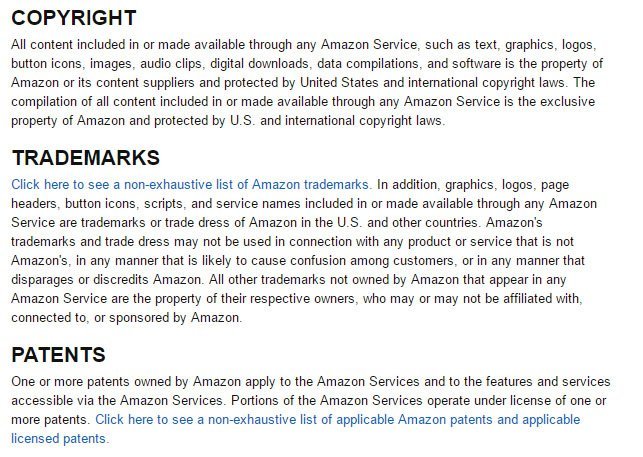
FIFA mentions its own trademarks and copyrights as well as those owned by third party designers that it is licensed to use:
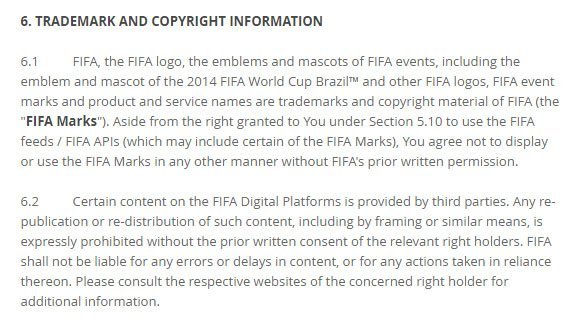
Apple is another large well-known company that is protective with its intellectual property. It uses plain language to make it clear that users are not to use these elements and yet provides a very detailed and extensive list:
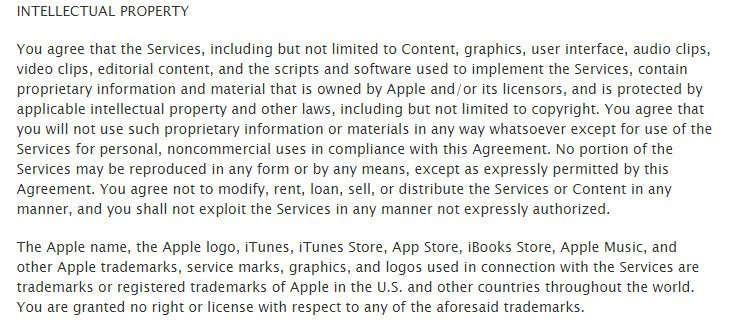
All of these statements indicate that using protected intellectual property without permission is prohibited.
Many Terms & Conditions agreements also include provisions that state a violation of the agreement leads to account suspension or deactivation. This may be listed under prohibited conduct or under a section regarding termination of accounts.
Apple explains that a violation of any provisions, presumably the intellectual property provision too, is grounds for termination:

Meetup also places enforcement measures under its prohibited conduct section. It explains that any intellectual property infringement is grounds for removal from the service:
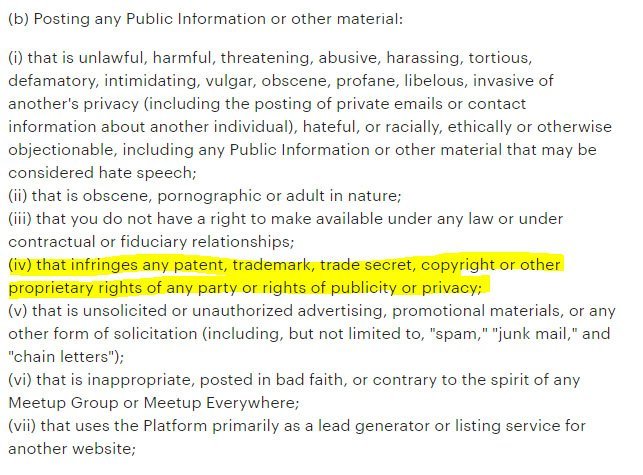
Your trademarks, copyrighted material, programs, and processes are all vulnerable. Take the needed steps to register them with the relevant offices, if you can afford to do so, but never forget to include them in your Terms & Conditions agreement.